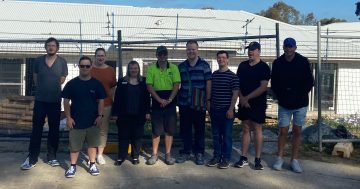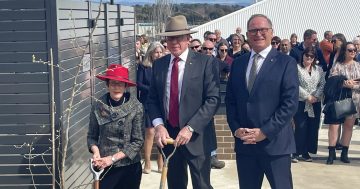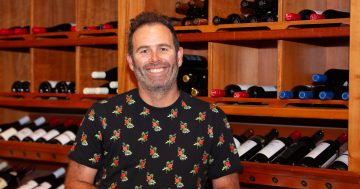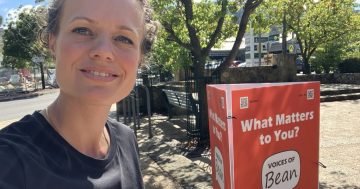
Glenn Keys and resident Leon Leary in the Hub house at Latham at the Project Independence Latham housing launch in 2016. Photos: Supplied.
A social housing model unique to Canberra that has enabled people with a mild intellectual disability to purchase their own homes is now set to be rolled out in Sydney and Melbourne and extended to other disadvantaged groups.
Project Independence, with help from the ACT Government and Canberra businesses and charities, has built two co-housing complexes with a total of 20 units and is awaiting the outcome of a development application for a third.
The model is based on up to 10 residents living independently in three separate homes, with accommodation for a live-in Resident Coordinator to support residents.
The Latham and Harrison sites were both opened in 2016, with the third to be in Phillip, which has already attracted 42 expressions of interest.
The youngest resident is 20 and the oldest 58, with 17 permanent residents across the two sites. One new resident is moving into Harrison this month and there are five applications for the last two units at Latham.
Project Independence is in discussion with two developers for a further two sites, as well as looking to expand interstate.
Founder and chair of Project Independence Glenn Keys, who is also Executive Director of Canberra-based Aspen Medical, said PI had held briefings in Sydney and Melbourne and already fielded 200 expressions of interest in Melbourne, where a committee was looking for land.
He said there was no other project like it in Australia, and he had not found another like it in the world.
“We see absolutely there could be Project Independence houses not only in Canberra but around Australia,” he said.
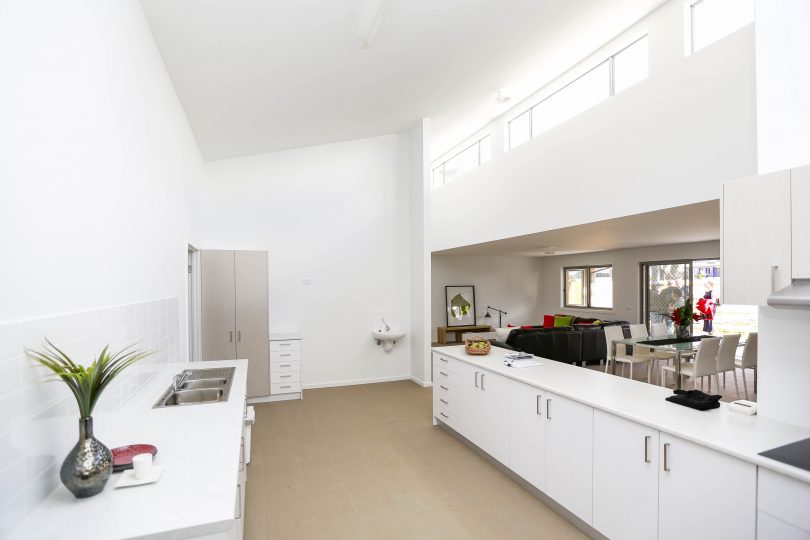
The Hub house at PI Harrison, where residents meet for community time and meals.
Mr Keys said people with an intellectual disability in this country had the lowest rate of home ownership in any sector in the country.
“So we thought if we have developed a model that works for them, can we develop a model that can work for other disadvantage homeowners?” he said. “All the preliminary data to date shows that it will.”
Two groups PI is focusing on are older women without superannuation or savings – which in Canberra is the second largest group of homeless – and families escaping domestic violence.
Collaborating with YWCA and ACTCOSS, PI is working on new financial models that have already received a “staggering amount of response”.
In the ACT, the Government has granted land but in Melbourne, parents may contribute to the cost of land, and in Sydney, two charities are willing to donate land.
“The thing that we really like about the model is that those people who can afford to pay and get out of social housing do so and go on to home ownership in their own right,” Mr Keys said. “It’s a great thing that frees up the dire need for social housing for people who really need it.”
It’s a long way from the humble conversation at a barbecue in 2008 between two fathers about their sons’ futures.
One of them was Mr Keys, whose son subsequently made him keenly aware that he wanted to move out one day and have his own home.
“It was a bit of a slap in the face. I have three kids – two without a disability and one with. And I naturally assumed that those other two would buy their own homes, but not that Aaron would,” he said.
It raised the questions that all parents of a child with a disability ask – ‘where will they live when I die, will they be alone and will they be safe?’
Mr Keys’s son’s aspiration was the catalyst to change the housing model the new group was considering, to one based on purchase.
The other father, David Hill, is now a director of Project Independence, and they were joined on the PI board by David Carr, a specialist in designing and building houses for people with a disability and Joseph Yeung, whose expertise is in finance and legal matters.
With the Government providing the land, Ernst and Young developed the financial model, Meyer Vandenberg Lawyers looked after the legal documentation, while AMC Architects and Ram Constructions assisted with the actual building.

The design of the proposed Phillip complex.
PI has also benefited from charities such as the recent Luton Charity Ball.
“The number of people who have stood up to help has been enormous,” Mr Keys said.
PI runs under a company title, which gives PI the controls needed to ensure the stability and longevity of the project while residents achieve ownership of the property, through a company share.
Applicants require about a 10 per cent deposit or $25,000, which presented a real financial barrier to the families but Mr Keys said they had reached out through their extended families to raise the deposit, despite charitable assistance on offer.
“They see here the opportunity for home ownership and to begin an accommodation journey for people with an intellectual disability that nobody else in this country has,” he said.
PI uses a maximum 75 per cent ($613 per fortnight) of residents’ Disability support pension or the equivalent amount if a resident does not receive the Disability support pension, with 89 per cent going towards operating costs and 11 per cent towards either a licence fee during the try before you buy period (the first 12 months) or the resident’s loan.
The try before you buy period ensures that PI is the right accommodation option for them. Once the 12 months is up residents choose to either stay or leave. If a resident decides to stay then the resident purchases a company share, giving them exclusive rights to their unit. Some will pay for the share outright, some may make a part payment and others will need to take up the offer of a PI no interest loan.
PI does not provide 24/7 care and does not suit everyone’s needs, with applicants requiring to meet a certain criteria.
It has been developed outside the NDIS so people can use their packages as they see fit.
Mr Keys said PI, which has been developed outside the NDIS so people can use their packages as they see fit, gave residents the autonomy and choice that everyone deserved, and was also a stepping stone to the next stage of their accommodation journey.
“We’re hoping somebody will be with us for a number of years, build up equity and then at some stage they’ll say ‘this has been fantastic and I now want to sell and move out because I’ve now learnt all the social skills and supported decision making that I need and I’m ready to have more autonomy’. It’s a few years away but entirely achievable,” he said.
PI was a God-send for Teresa, who is in her 50s and lost both parents within a year, leaving only a brother to care for her. Ineligible for a range of accommodation, it had been recommended that she go into an institution.
“When we found out I got it, we just hugged each other,” Teresa said with her brother Les. She became one of the pioneering residents at the Latham development.
Sixteen months later she is now a permanent resident and increasingly independent.
When she was asked how she felt about being accepted, Teresa gave an enthusiastic thumbs up, “I got a high five from the resident coordinator MJ, I told him, I’m getting my own place, and he gave me a high five, that made me feel good and proud.”












